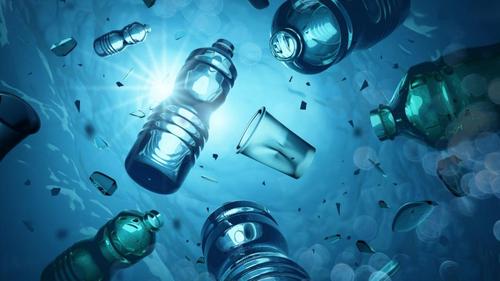411
Plastic in Our Brains? Why the Global Plastic Crisis Is More Personal Than Ever

April is Earth Month, and there’s never been a better time to have a hard conversation about the state of plastic pollution. Last August, a study revealed something deeply unsettling: human brains examined under the microscope were found to contain plastic — nearly 0.5% by weight. Let that sink in.
We’ve heard for years that microplastics are in our oceans, our soil, and our water. But now? They’re in us. And not just in trace amounts — we’re talking about plastic in our bloodstreams, breast milk, placentas, even testicles and arteries.
This isn’t just a distant environmental problem. It’s personal.
The Big Lie About Recycling
For decades, we were told a comforting story: that if we just tossed our plastics into the blue bin, they’d be reborn into something useful. But the truth is messier — and more alarming.
Most plastic isn’t actually recycled. It’s incinerated, dumped, or left to break down into toxic micro and nanoplastics. The small fraction that is recycled? It can only go through the process once or twice before becoming waste again.
Recycling, in its current form, isn’t the solution we hoped for.
The Health Risks Are Real
Microplastics don’t just sit quietly in our systems. These particles, made from petroleum-based chemicals, can leach toxins into our bodies — raising our risk for heart disease, cancer, diabetes, and other serious conditions.
And with each study that emerges, the message gets louder: this is a public health emergency, not just an environmental one.
So, What Can We Actually Do?
Let’s be clear: going fully plastic-free is nearly impossible. The material is everywhere — embedded in our daily lives. But change doesn’t require perfection; it requires progress.
Here are real-world steps we can all take:
-
Choose refillable or reusable options for personal care and cleaning.
-
Opt for recyclable materials like glass, aluminum, bamboo, and paper.
-
Buy secondhand from local markets or online platforms like Facebook Marketplace and Yaga.
-
Avoid fast fashion giants like Temu and Shein that profit from overproduction and waste.
And perhaps most importantly, push back against greenwashing.
Industry: Time to Get Real
Consumers are doing their part. Now it’s time for businesses to step up. That means offering genuinely sustainable products, not just clever marketing.
Real change means:
-
Transparent labeling.
-
Responsible packaging and ingredients.
-
Products that serve both people and the planet.
This isn’t about corporate charity — it’s about survival. The market is changing fast. Consumers are demanding better, safer, smarter choices. The only question is: who’s going to lead?
The plastic crisis isn’t out there. It’s in us. It’s in our air, our water, and now, our brains. The longer we wait to act, the deeper it goes.
April may be Earth Month, but the urgency of this issue goes far beyond 30 days. It’s time to wake up, wise up, and speak up — for our health, our planet, and future generations.
{Source: 2 Oceans}
Follow Joburg ETC on Facebook, Twitter , TikTok and Instagram
For more News in Johannesburg, visit joburgetc.com


















